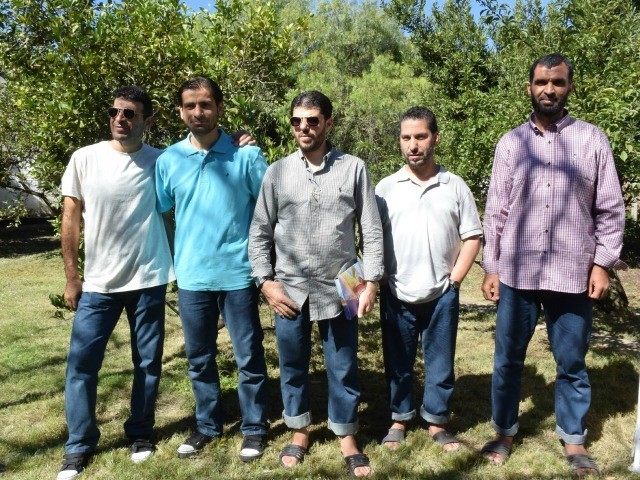Five of the six former Guantánamo Bay detainees being hosted by Uruguay are refusing to sign an accord with the local United Nations body that would pay for their rent and utilities for one year, demanding that the United States subsist their lives and claiming they were promised three years of free living in the Latin American nation.
Four of the five that have refused to sign the agreement to have their expenses paid have camped out in front of the U.S. embassy in Montevideo for the past three days, according to Uruguay’s El Pais. One cited health issues for not being able to join the others, and the one who has signed the agreement told the press that he is on good terms with the others.
The Uruguayan government has not removed them from the embassy’s front, citing their “absolute freedom of movement” in the nation. Minister of Foreign Affairs Rodolfo Nin Novoa told El Pais that the government may require the men to sign the agreement in order to continue efforts to find their families and move them to Uruguay, as well. “They have to sign the agreement that extends until February 2016, which basically asks them to learn Spanish so that they can join the workforce and to take care of their health,” Nin said.
The four have established a Wordpress blog to express their frustrations with the new system. In that message, they describe Uruguay as “a tiny nation with a big heart,” explaining that they are protesting before the U.S. embassy because “the government of that country detained us erroneously for 13 years, and now they must provide us what is necessary for us to lead a normal life like human beings.” “They cannot delegate their mistakes to others,” they add, “they must help us with residences and financial support.”
The message also claims that Uruguay’s ministry promised three years of support, not one.
Nin Novoa noted that the reason for the deal lasting only one year was that, upon their families arriving in Uruguay, they would have to reassess what kind of living space and financial support they would need. “The prisoners themselves have not defined, through the Red Cross, who they want to transfer from abroad here, how many family members they want to bring,” Nin explained. Without that information, Uruguay can do little to help them with housing. Nin added that Uruguay “wants to give them the peace of mind that, when the agreement ends, we will keep working to not leave them out on the street.”
The Red Cross has been tasked with finding the family members of the six men in the Middle East, many from Tunisia, Syria, and Palestine. Officials believe that having their families with them will help the former detainees settle into life in Uruguay. They have had significant difficulties in doing so, being unable to land jobs due to not learning Spanish and frightening neighbors with loud disputes among each other.
In addition to its program to reintegrate Guantánamo Bay prisoners to society, Uruguay has shut down its program to receive refugees from the Syrian Civil War, citing too many “cultural” differences and insufficient resources to overcome them in March.

COMMENTS
Please let us know if you're having issues with commenting.